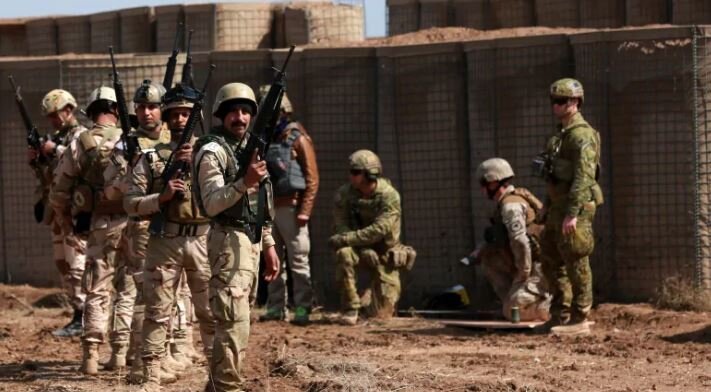Coalition forces train Iraqi soldiers during a military exercise at Camp Taji. (Credit: Hadi Mizban, AP)
The US-led Coalition in Iraq and Iraqi authorities confirmed that at least 2 US service members and 1 British soldier were killed late Wednesday evening at the Camp al-Taji military base near Baghdad. At least 15 Katyusha rockets were fired at the base from a nearby position, hallmark tactics of the Iranian-sponsored PMU militias in Iraq.
Although not yet placing blame, US Secretary of State Mike Pompeo promised that those responsible for the attack would be “held accountable.” Operation Inherent Resolve (OIR) spokesman Col. Myles Caggins confirmed the deadly strike, which also wounded at least 11 Coalition personnel. Although there has been no claim of responsibility, analysts have previously ruled out the remnants of ISIS in previous rocket attacks on US bases, as the terrorist group does not have access to the type of munitions used.
Shortly after the attack, a PMU base at al-Bukamal, Eastern Syria near the Iraq border was pummeled by an airstrike, killing at least 18 militiamen. Coalition forces denied involvement in the strike, stating it was not retaliation for the attack on al-Taji. The Israeli military has previously admitted to striking Iranian-linked militias and the Iranian Revolutionary Guard Corps (IRGC) along the Iraq-Syria border, attempting to disrupt the weapons pipeline that runs between Iran and the Syrian-Lebanese borders with Israel.
Wednesday’s attack on Camp Taji is the second deadly attack on an Iraqi base housing Coalition troops, after a US contractor was killed in last December in a similar rocket attack. That incident led to a spike in tensions between Iran and the US that culminated in the assassination of IRGC commander Qassem Soleimani in January.
Sources:
https://www.bbc.com/news/world-middle-east-51842744
https://twitter.com/CarlaBabbVOA/status/1237929451297611776
https://twitter.com/SecPompeo/status/1237920302421741568
https://twitter.com/SecMedCell/status/1237873853226840064
https://twitter.com/OIRSpox/status/1237823573672239110
https://twitter.com/DanLamothe/status/1237853725118496768
https://twitter.com/SkyNewsArabia_B/status/1237851839661346816
https://twitter.com/SaadAbedine/status/1237840950363217920
https://twitter.com/MazAlJumaily/status/1237847841738911748
https://twitter.com/SchoenbornTrent/status/1237847321825538050
https://twitter.com/SkyNewsArabia_B/status/1237845643151863810





